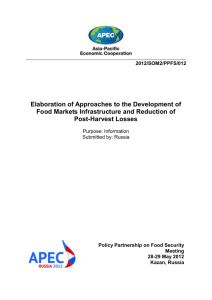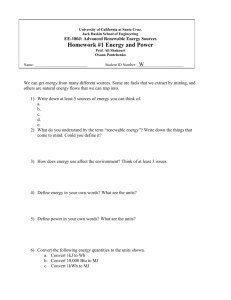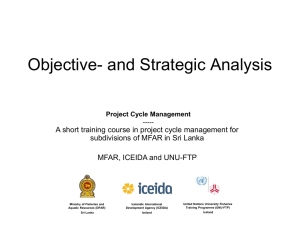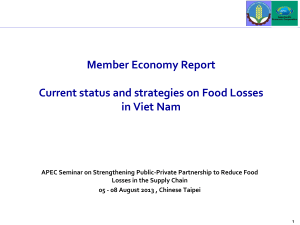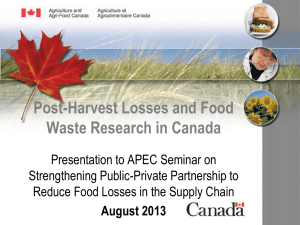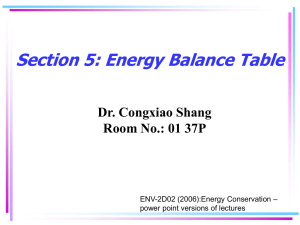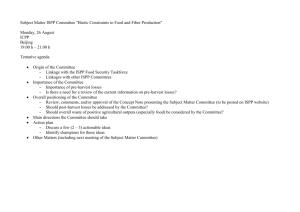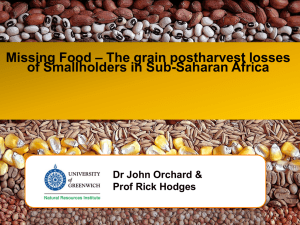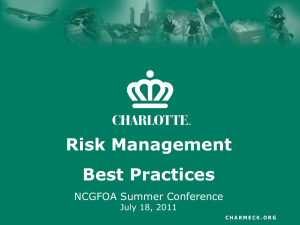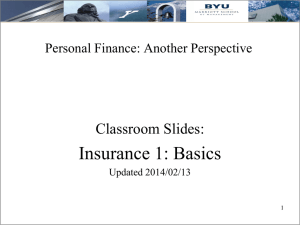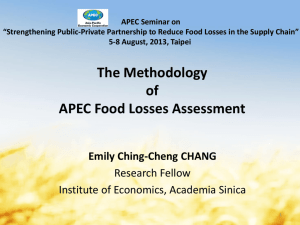Member Economy Voluntary Reports—Thailand
advertisement
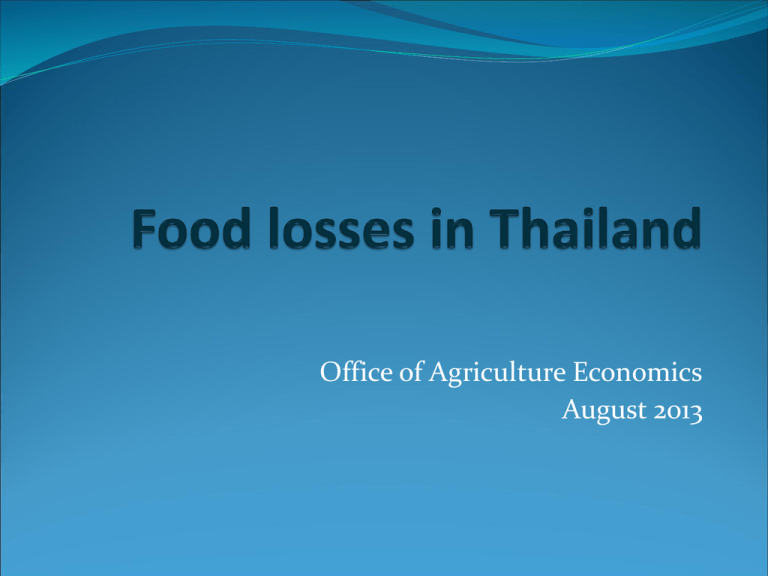
Office of Agriculture Economics August 2013 Outline Current Status ( focus on Losses in Fruits and Vegetables ) Problem Policies and Strategies Suggestions for APEC Cooperation Percentage of crop production area in four regions of Thailand in 2011 Source: Amara Chinaphuti, Department of Agriculture Major Fruits & Vegetables of Thailand Fruits Vegetables Mango Chinese cabbage Pineapple head cabbage longan, tomato, chili Pummelo ginger, potato Durian Mangosteen Rambutan Kluaikai banana Lychee onion, garlic Lettuce, sweet pepper basil leaf water spinach, parsley cucumber, yard long bean, baby corn and cauliflower. Post-harvest losses in Thailand Fruit: 20-50% Vegetable: 30% Rice: 30% Source: Department of Agriculture Post-harvest Losses of some Selected Fruits in Thailand Process Harvest Transport Market Post-harvest losses (%) Mango Citrus 10-50% 5-30% 14-47% 1-4% 10-40% 2-20% Source: Department of Agriculture Losses of Vegetable from Farm to the Wholesale Markets in Thailand (%) Crop Weight loss Defect Gourd 1.33 Bitter gourd 1.59 Cucumber 2.55 Sweet pepper 4.88 Pepper 3.26 Tomato 3.33 Cabbage 1.49 Source: Amara Chinaphuti 1.48 2.19 3.77 5.13 3.96 6.89 3.19 Crop Weight loss Defect Kale 3.41 Lettuce 2.87 Rape 2.87 Chive 2.88 Chinese cabbage 1.57 Parsley 8.47 Spring onion 4.81 4.83 2.58 2.35 2.35 3.32 7.73 4.49 The Status of Post harvest Technology in Thailand: Post harvest Loss (PHL) Major Causes of PHL Physiological factor Biological factor Physical factor Physiological factors Inferior fruit quality due to immature fruit occur at the harvest time Uneven ripening Browning and chilling injury of fruit and vegetable Water loss due to transpiration rate Ethylene effects Biological factors Physical factors Diseases Mechanical injury Insect pest Poor harvesting practices Inappropriate packaging Poor temperature and humidity control Poor transportation and road infrastructure Losses due to Poor Handling and Packaging Losses due to Poor Storage Problem Lack of proper knowledge and technology transfer to the farmers. Postharvest infrastructure and technologies are costly and sometimes does not give a economic returns. Less funds are available for R&D. Lack of investment/involvement of local manufactures in constructing small scale need based postharvest infrastructure Less awareness of policy makers and general public for the need to reduce/prevent food losses after harvest Problem Low prices on the local market which discourage the farmer to use the proper packaging and transportation. High packaging and transportation cost. After harvesting, most of farmers are not aware of methods to prepare the produce in proper manners such as cleaning, grading and trimming are not carried out systematically. Less co-operation among the stakeholders in quality management system along the production chain Policies and Strategies The Ministry of Agriculture and Cooperatives (MOAC) has launched its Food Security Strategic Framework (2013-2016) The MOAC’s Food Security Framework consists of 1 2 4 Strategic Trusts. 3 4 Produce Support Enhance Maintain adequate everyone quality food stability food for to have of food sustainable an access production, to food domestic reduce waste consumption and utilize properly 3. Enhance quality of agri. food production, reduce waste and utilize properly Guide lines: Reduce the losses in agri. food production by support R&D and promote (1) food processing technologies in order to increase value-added of food and agricultural product (2) post-harvesting technologies to maintain quality and shelf life of food as long as possible. Support reducing the loss of food waste from the unnecessarily consumption, by raising awareness about an impact on food security and campaign throughout local and national level Develop agricultural information system and access to information (Create network of agri. info, Develop of agriculture media as ways for transferring agriculture technology and innovation to farmers) Suggestions for APEC Cooperation Strengthen the information system projects within the framework of international cooperation. Support a joint research and study on food waste food losses in APEC economy. Continue to provide forum for discussion on knowledge, best practice and technologies to reduce post-harvest loss in region. Develop joint initiatives and efforts to reduce food losses. Thank you
